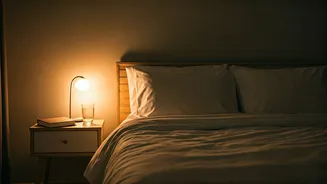Create Sleep Sanctuary
Building a sleep-friendly environment is essential for good rest. First, ensure your bedroom is dark, quiet, and cool. Consider using blackout curtains
to block out light, which can disrupt sleep cycles. Earplugs or a white noise machine can help minimize noise disturbances. A comfortable mattress and pillows are also crucial. Make sure your bedroom is at a comfortable temperature; research suggests that a slightly cooler room promotes better sleep. Lastly, keep your bedroom exclusively for sleep and relaxation, avoiding work or screen time in bed to train your mind to associate the space with rest.
Consistent Sleep Schedule
Maintaining a consistent sleep-wake schedule is critical for regulating your body's natural sleep-wake cycle, or circadian rhythm. Aim to go to bed and wake up around the same time every day, even on weekends, to regulate your internal clock. This consistency helps your body anticipate sleep and wakefulness, making it easier to fall asleep and wake up feeling refreshed. If you find yourself struggling to sleep, avoid sleeping in to catch up. Instead, maintain your regular sleep schedule, and your body will eventually adjust. Aim for a consistent sleep duration, typically 7-9 hours per night for adults, to optimize your health and well-being.
Manage Light Exposure
Light exposure plays a significant role in sleep regulation. During the day, expose yourself to bright light to help regulate your circadian rhythm. Sunlight is the best source of bright light, so try to spend time outdoors, especially in the morning. At night, minimize your exposure to blue light, which can interfere with melatonin production. Blue light is emitted from electronic devices like smartphones, tablets, and computers. Dim the lights in your home in the evening, and consider using blue light filters on your devices or wearing blue light-blocking glasses if you use them before bed. By carefully managing your light exposure, you can signal your body when it’s time to sleep and wake up.
Avoid Sleep Disruptors
Certain substances and activities can disrupt sleep, so it's best to avoid them, particularly close to bedtime. Avoid stimulants like caffeine and nicotine, as they can interfere with your ability to fall asleep. Alcohol can initially make you feel sleepy, but it often leads to disrupted sleep later in the night. Avoid large meals or heavy exercise close to bedtime, as these can make it harder to fall asleep. Napping can also disrupt sleep if you nap for too long or too late in the day. If you must nap, keep it short (20-30 minutes) and earlier in the afternoon. Creating a relaxing pre-bed routine, such as taking a warm bath, reading a book, or listening to calming music, can also help prepare your body for sleep.
Reviewing Your Sleep
After putting the tips into practice, keep a sleep journal to monitor your sleep quality and make adjustments as needed. Note your bedtime, wake-up time, how long it took to fall asleep, and any factors that might have affected your sleep. Evaluating your diet or recent events can assist you in pinpointing areas for improvement. If you continue to struggle with sleep, consult with a healthcare professional. They can evaluate underlying issues and recommend additional strategies to improve your sleep quality. Implementing these techniques allows you to cultivate healthy sleep habits, enhancing your overall well-being and health.






















![[WATCH] 'Real Madrid, Ramadan and rest' - Mohammed Siraj how last-minute World Cup call-up changed February plan](https://g-mob.glance-cdn.com/public/fc/image/ByYT_LEmlrD0.webp)
